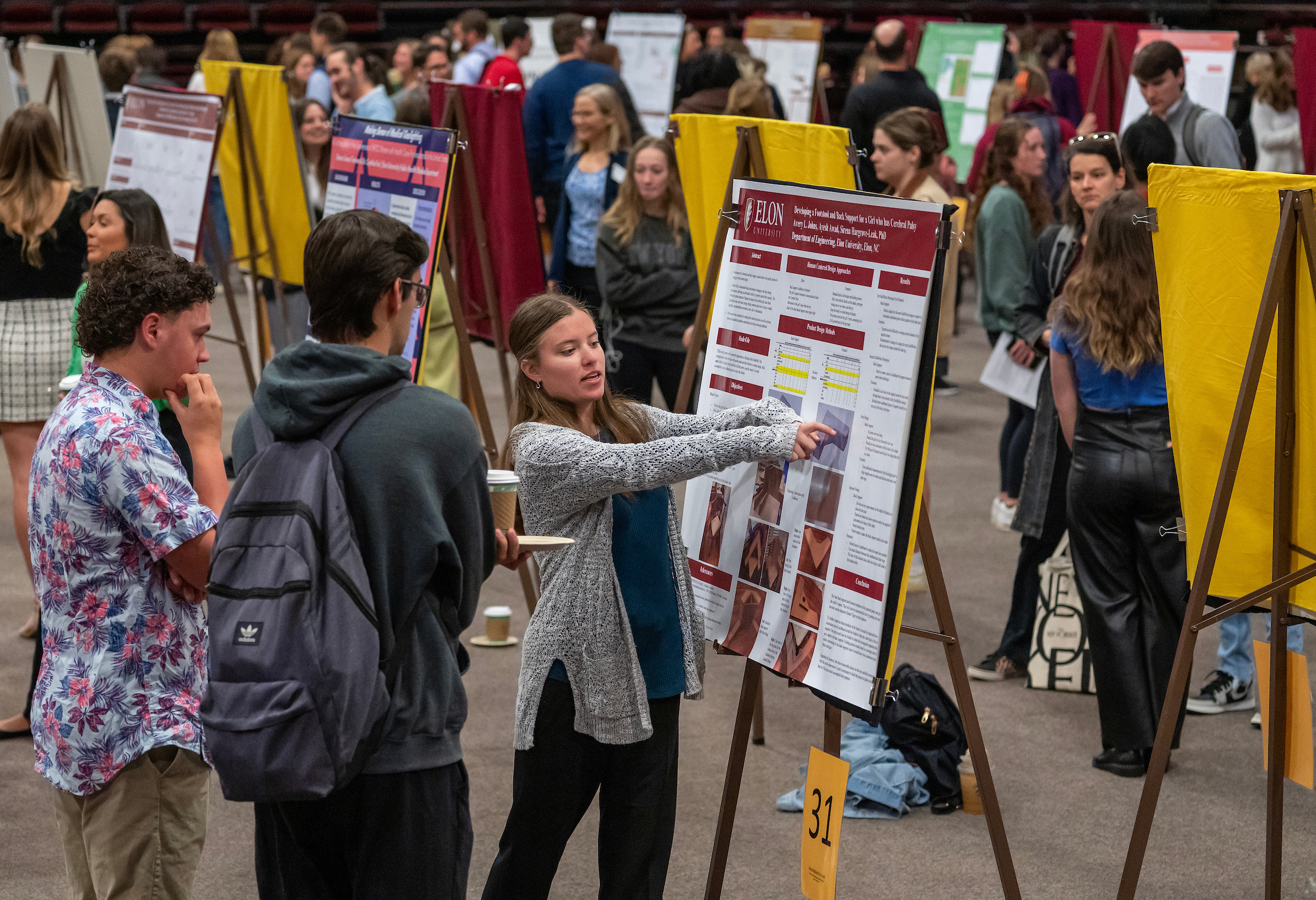The 30th anniversary of the university's most significant celebration of undergraduate research also sees its largest participation in history.
Tuesday’s annual Spring Undergraduate Research Forum celebrated 30 years of Elon students who have intrigued, surprised and captivated the university community with their ingenuity and innovation as undergraduate researchers.
With 270 presentations, the 30th iteration of SURF saw the highest level of participation. At locations across campus, 152 poster presentations and 118 oral presentations showcased new findings and and extensive exploration of topics from a plethora of academic disciplines.
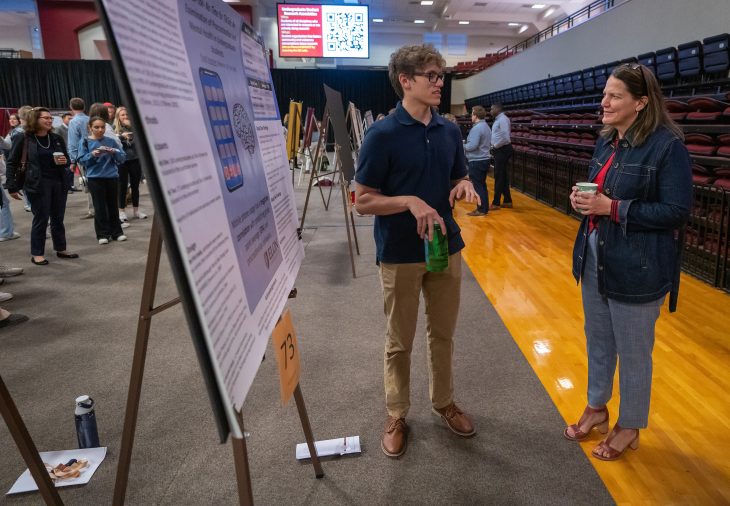
“The energy that’s here right now is just fantastic,” said Eric Hall, director of Undergraduate Research and mentor to seven projects presented at this year’s SURF Day. “It’s great to see the growth of the program as a whole over time. This feels like a national conference … with the quality of the posters and the number of people interacting.”
While each student has a different journey toward undergraduate research, the outcomes and the rewards are often the same. Sage Albert ’23 arrived at Elon knowing that undergraduate research was in her future as an Elon College Fellow. The drama and theatre studies and music in the liberal arts double major was first introduced during her first year at Elon to the topic that would become the focus of her research. Albert’s research explores how an understanding of emotional expression in music strengthens the communication of emotions between the performers and the audience.
“Theater specifically, even the performing arts, has such a strong impact on society because it teaches emotional comprehension. It also helps people work through issues of their own. And I think, as performers, understanding that and making sure we get it right can help tons of audiences,” Albert said.
She says her undergraduate research has transformed her into a stronger scholar. Giving her both a sense of purpose and continuity over her four years at Elon, it has given her an invaluable lesson to use in her future. “It’s been interesting learning how I can become a stronger performer through the action of researching.”
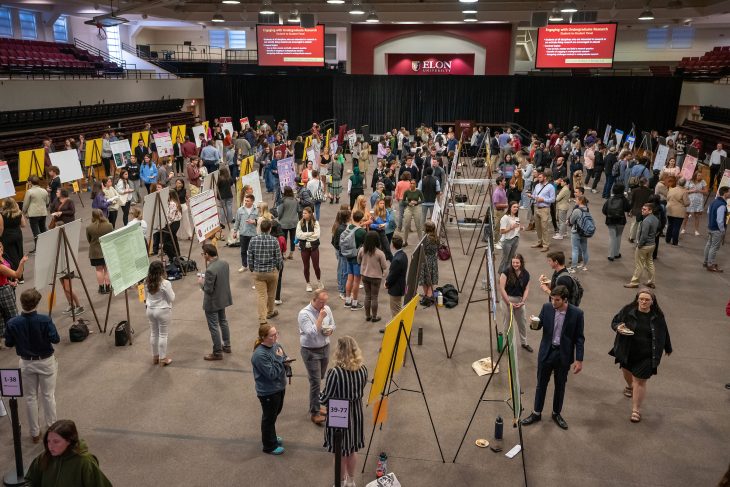
For Lucy Garcia ’23, an Honors Fellow and environmental studies major, SURF Day was the culmination of the undergraduate research experience that was part of her motivation to come to Elon.
“I was scared about undertaking and completing a research project, but I knew I wanted to push myself. I knew Elon was the only school where I would complete it because of the infrastructure that exists here for research and because the faculty are so supportive of it,” Garcia said.
Garcia used GIS mapping and Alamance County archival materials to trace the growth and eventual disappearance of “Black Bottom,” an area of downtown Burlington densely populated by Black-owned businesses from the 1890s to the 1960s.
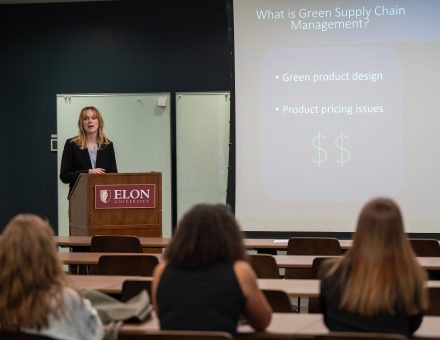
She learned of the Black business district through Honors Fellows seminars and the Power and Place Collaborative, where she and classmates toured areas of Burlington with directors of Alamance County’s African-American Cultural Arts and History Center and interviewed residents of historically Black neighborhoods about the community.
By the 1970s, the city extended Maple Avenue through the district, and the area was considered blighted by the time most businesses closed or relocated to other areas. She’ll present her research along with maps and other findings at the African-American Cultural Arts and History Center in Burlington on Saturday, April 29.
Garcia called herself “the poster child for Elon’s constellation of mentors,” citing connections with her mentor, Associate Professor of Geography Ryan Kirk, as well as those with other faculty and staff including Associate Professor of Geography Sandy Marshall, Director of Design Thinking and Associate Professor Danielle Lake, Associate Professor of Philosophy Lauren Guilmette and Archivist and Assistant Librarian Libby Coyner.
Undergraduate research is one of the five Elon Experiences, and close to 90 percent of members of each graduating class have participated in undergraduate research in some fashion. In March 2022, Elon was ecognized by The Council on Undergraduate Research with the 2021 Campus-wide Award for Undergraduate Research Accomplishments for providing its students with high-quality research experiences.
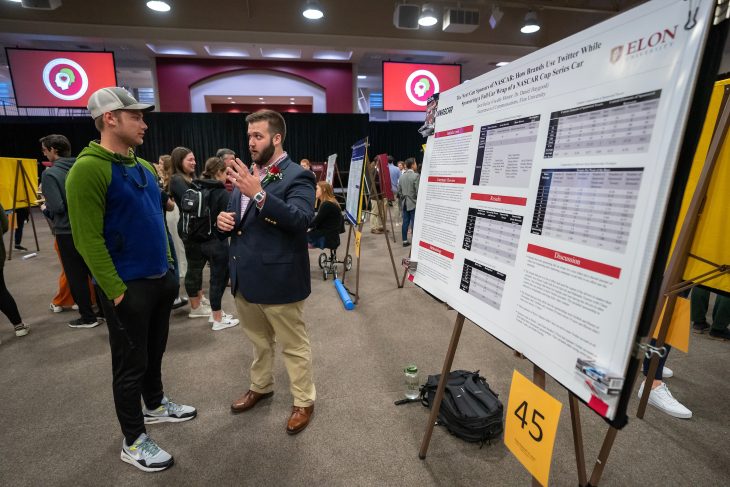
Undergraduate research was not on Brett Bailey’s radar as an underclassman. He also wasn’t much of a fan of stock racing. But an internship with NASCAR the summer before his senior year escalated his interest in both.
Bailey’s research examines how brands use integrated marketing communication on Twitter while sponsoring a full car wrap of a NASCAR Cup Series car. Through his research, Bailey was able to highlight some of the innovative and technological marketing from companies.
Bailey found that 70% of the brands sponsoring Cup Series cars were very active on Twitter and a significant portion of sponsors (66.5%) were active during the week leading up to the race and 36.7% of sponsors live-tweeted during the race.
Although initially reluctant to get involved in SURF, Bailey found the experience greatly enjoyable and that his faculty mentors, Professor of Strategic Communications Daniel Haygood and Associate Professor of Sport Management Young Do Kim, pushed him to excel academically.
Seeing his growth as a scholar is something that gives Bailey great pride and his Elon experience has been better for his undergraduate research. “SURF really allowed me to expand on all the things that I’ve learned in the classroom. It gave me the structure and the freedom of being able to do what I wanted.”
A sense of pride is one of the main things Hall hopes student researchers will take away from their SURF experience. The nerve-racking process of not only conducting in-depth research but condensing it and having to explain it to faculty, staff and their peers is no easy fate. And it’s one that students should be proud of themselves for completing.
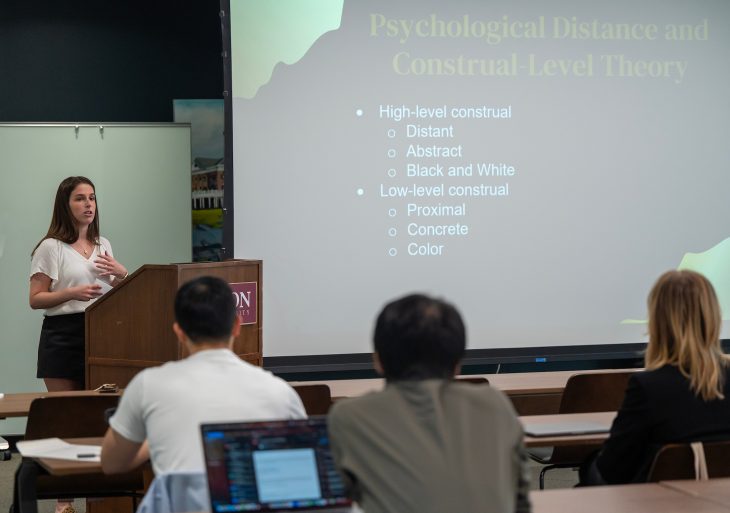
“I hope the students who present today are proud of themselves for what they’ve accomplished,” Hall said. “I hope they also start to think about what they’ve learned from their research experience and how that will help them out in grad school and their careers.”
A close working relationship with a faculty mentor is part of what makes undergraduate research appealing, and Jennifer Tran ’23 said that’s what she found. She worked with Assistant Professor of Biology Jessica Merricks to study the experiences of Elon’s Odyssey Scholars in STEM majors. Increasing access and belonging in STEM majors for first-generation and students from diverse backgrounds is an institutional priority at Elon.
Tran, an Odyssey Scholar and biology major, was interested in finding out the experiences of other Odyssey Scholars and surveyed and interviewed her classmates about their STEM class experiences. Students who remained in STEM majors cited support from classmates, faculty and programs, while those who transferred to different majors cited peer competition and a perceived lack of course options as their reasons. Odyssey Scholars said they wanted to see more networking opportunities in STEM and contact with successful alumni and peer mentors.
Along with undergraduate research, Tran completed all five Elon Experiences — which include study abroad, service learning, leadership and internships.
“I’ve had a lot of mentors during my time at Elon, but Dr. Merricks specifically has been a godsend. I don’t think I would have been able to do research if it wasn’t for her. She has been my rock through this entire process, from gathering data and talking with the Odyssey Scholars program,” Tran said. “We only had a year to complete this project. We did a lot of work in a very short amount of time, and this gave me a set of critical thinking and problem-solving skills I wouldn’t have had otherwise.”
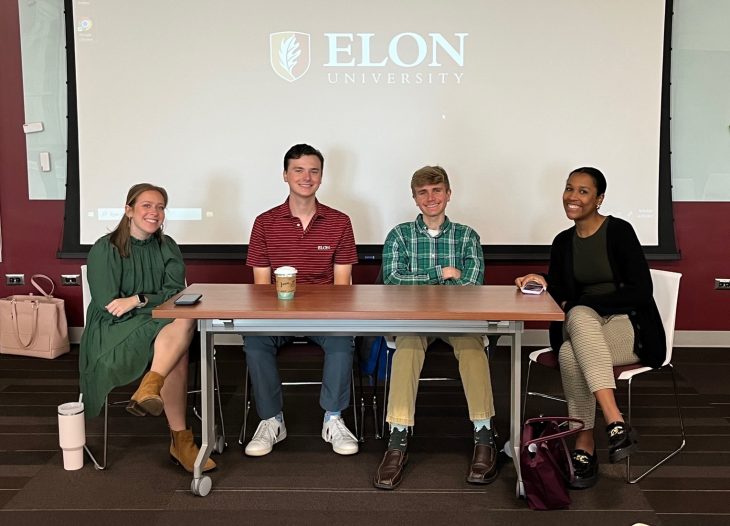
The Student-to-Student panel on “Engaging with Undergraduate Research” touched on many topics, including how undergraduate research will help they’re in their lives post-Elon. The panel, sponsored by Elon’s Undergraduate Research Student Association, included four undergraduate researchers — Christopher R. Boyette, Ellery Ewell, Sophie I. Miller and Cole Powell.
Boyette, whose research focused on the effect of teacher salary freezes on student achievement in Michigan public schools, said the experience of undergraduate research has helped him narrow down his career path. Boyette is on his way to pursuing a doctorate in economics at Michigan State University and said his undergraduate research experience was integral to that decision. “It helps you know what you want to do earlier … and the more progress you can make,” Boyette said.
Miller, whose research examined how children and teachers co-facilitate inquiry and reflection outdoors, said research has helped her “be aware that other people are going to have different opinions.”
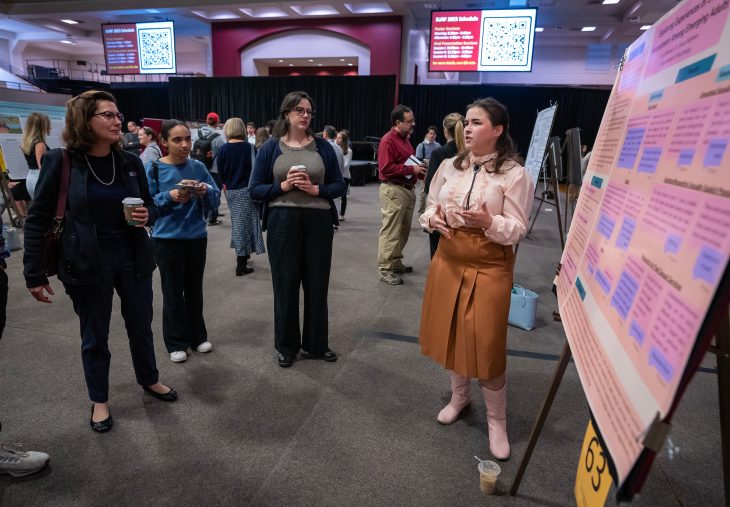
Along with the commitment to undergraduate research, the 30th anniversary SURF at Elon also featured a display of the importance of a global education with the “From the Field: Ethnography for Human Understanding” symposium. The interdisciplinary symposium showcased five student research projects that employed ethnographic methods to study processes of identity formation in a variety of cultural settings.
The five projects focused on post-Arab Spring Egypt (Natalie Triche ’23), the Israel/Palestine conflict (Maddy Starr ’23), the Sri Lankan community of Staten Island (Peyton Rohlfs ’23), the homeland of the Sikh community in North India (Darsev Kaur ’23) and the experiences of queer farmers in the Appalachia mountains (Samantha Schwamberger ’23).
Even as SURF has celebrated the highest participation in its 30-year existence, Hall and his colleagues in the Undergraduate Research Program — Associate Director Jen Hamel and Associate Director Qian Xu — continue to explore how the program can continue to grow. Hall hopes that aside from the student participants, their peers who aren’t involved this year will be for future SURF events.
“For us to stop classes for a day to showcase this event really tells a lot about our institution’s commitment to undergraduate research. But it’s also an ability for students to learn from it and hopefully participate in the future,” Hall said.



